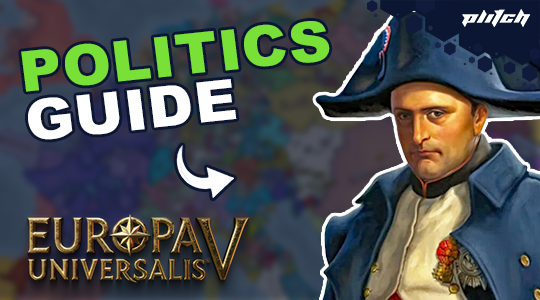In this Europa Universalis 5 diplomacy guide, you’ll learn how to forge strong alliances, earn and spend favors wisely, and use Casus Belli to justify your wars. We also cover how diplomatic range, trust, and reputation influence your relations and how to handle each step from peace talks to full-scale conquest.
Table of Contents
Europa Universalis 5 Diplomacy Basics
Every nation in Europa Universalis 5 begins with a limited number of diplomats, and each one counts. You allocate them toward actions such as:
- Forming alliances
- Proposing royal marriages
- Building spy networks
- Improving relations
Diplomats now serve as a form of diplomatic currency. When they are busy strengthening relations or currying favors, you must wait until they return before starting new tasks.
You can grow your diplomatic strength by:
- Advancing your societal values
- Upgrading your country rank
- Increasing diplomatic spending
- Constructing the Royal Garden in your capital
Your Diplomatic Range in Europa Universalis 5 determines how far your influence extends. At the beginning, it’s quite limited. For example, England can interact with the Mamluks but not with Yemen initially. As your nation develops, your reach grows. The Foreign Envoys in the Age of Renaissance increase your range by 33 percent, allowing access to more nations across the map.
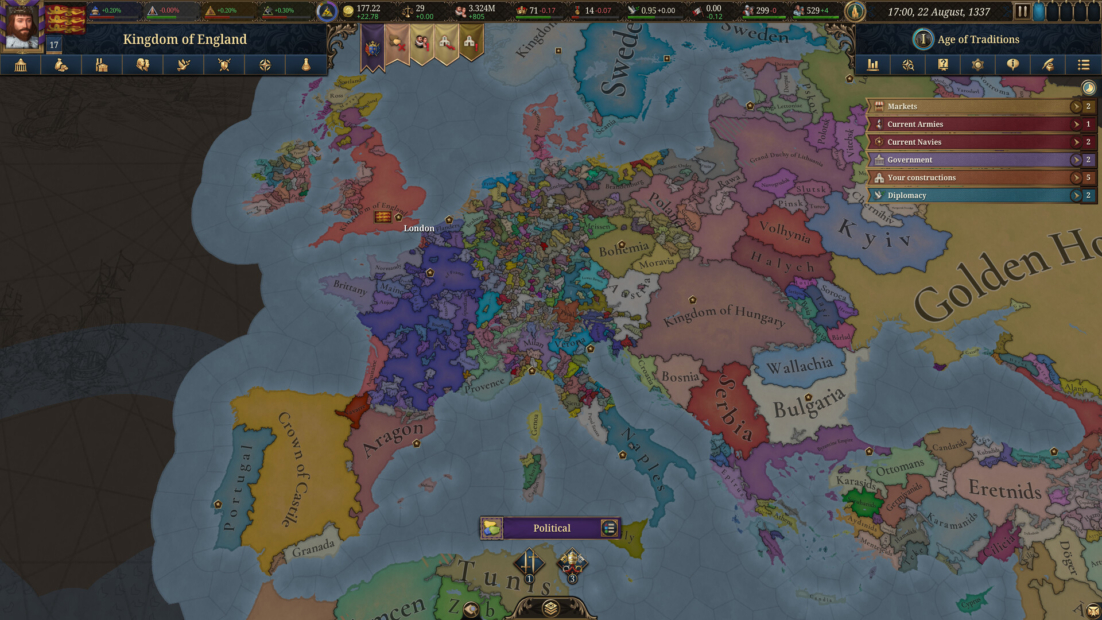
Managing Diplomatic Capacity is just as important. This system limits how many formal relationships your nation can sustain. Each ally, subject, or organization uses up capacity. Stronger nations take up more space in your diplomatic budget. You can exceed the limit, but it will greatly impact subject loyalty, diplomatic reputation, and crown power.
To improve your situation, increase your Diplomatic Spending in the economy tab. This boosts:
- Subject loyalty
- Diplomatic capacity
- Number of diplomats
- Monthly diplomat generation
Your Diplomatic Reputation in Europa Universalis 5 reflects how other nations view your reliability. A strong reputation makes it easier to form alliances, vassalizations, and peace agreements. This value grows through reforms, laws, advances, and your overall behavior. It directly influences Trust, a shared measure between two countries that shows how much they believe in your promises. If you break an alliance or betray an agreement, that trust can disappear quickly.
Lastly, keep an eye on your Rivals. Declaring another nation as a rival unlocks hostile actions such as humiliation wars and war interventions. However, it also blocks peaceful diplomatic options. Choosing the right rivals early can completely change your campaign’s path.
How Favors Work
In Europa Universalis 5, favors are the lifeblood of diplomacy. They’ve replaced the old flat modifiers from previous games and now serve as a dynamic form of political currency. You earn them by helping other nations, whether that involves sending gifts, joining their wars, or keeping your word when called to arms.
Favors are your political bargaining chips. You can:
- Curry favors with other nations to build influence
- Spend favors to request military or diplomatic support
- Exchange favors carefully, since spending them gives the other nation favors on you in return
Use them wisely, because turning down a favor can harm your Trust and hurt your Diplomatic Reputation for months.
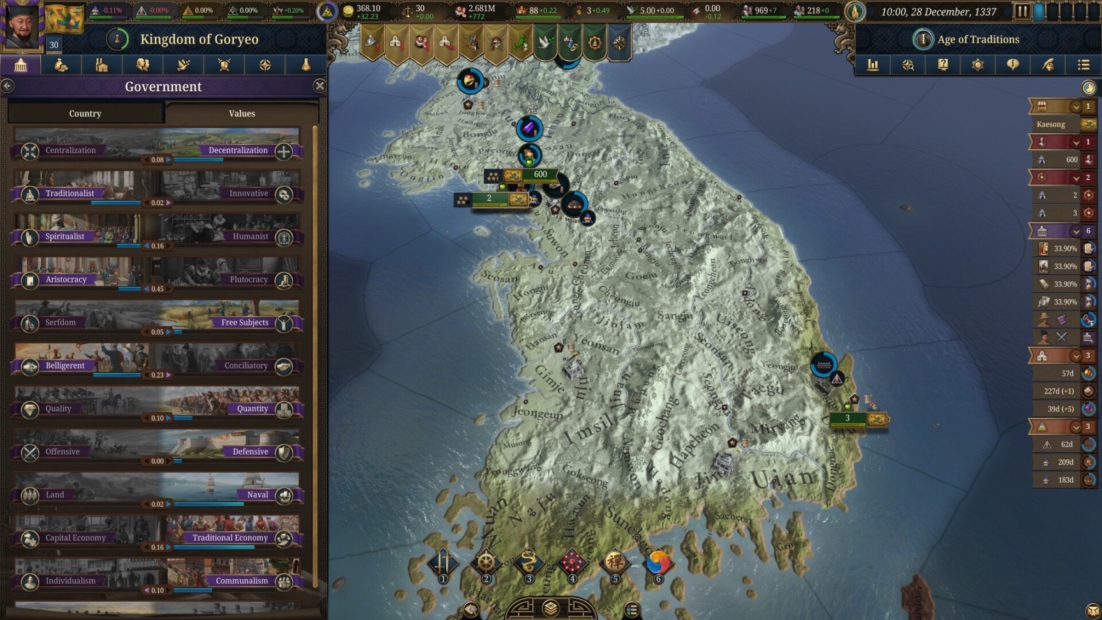
What makes this system so interesting is how fluid it is. Favors can actually transfer between nations. If France sends you financial aid through favors, those favors are also transferred back to France, creating a debt that can influence your future relationship. Today’s ally might become tomorrow’s creditor. This results in constantly shifting alliances and subtle power plays between nations.
Tip: Think twice before accepting money through favors in Europa Universalis 5. It might fix your short-term cash issues, but you’ll owe a debt that could cause problems later when politics become complicated.
Each diplomatic move has its own favor cost and strategic weight.
- Calling allies to war usually costs several favors, but it can determine the outcome of a major conflict.
- Forming trade or diplomatic agreements often requires fewer favors but helps you establish stable long-term partnerships.
- Claiming foreign territory through diplomacy is costly, but it’s one of the most effective ways to expand without a full-scale war.
Balancing these decisions is key. Burn through your favors too quickly, and you’ll lose your diplomatic edge. Save them too long, and you risk missing crucial opportunities.
Declaring War in Europa Universalis 5
Sometimes diplomacy reaches its limits. When words fail and patience runs out, war becomes the only option left. In Europa Universalis 5, war is a strategic political move, and the Casus Belli is your way to initiate it.
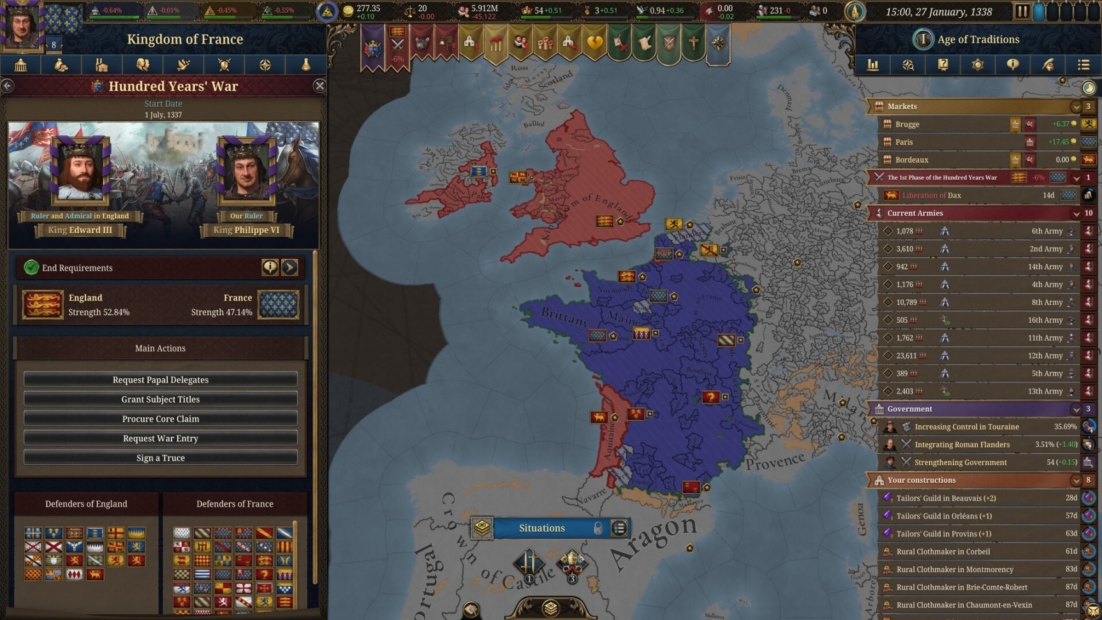
Casus Belli, Latin for “cause for war,” is your official reason for conflict. You can’t just attack another nation without repercussions, or at least not without paying a steep price. Declaring war without a CB is possible, but it will lower your stability and raise your enemies. Unless you enjoy making enemies quickly, you’ll want a solid cause before you send your armies into battle.
How to Get a Casus Belli
You can create CBs in Europa Universalis 5 through various methods:
- Spy networks: Develop them by deploying diplomats. These can unlock CBs for disrupting trade, humiliating rivals, punishing piracy, or declaring on excommunicated rulers.
- Parliament actions: The ‘Prepare for War’ decision costs 50 percent support in Parliament and grants you a Conquest CB. It serves as your primary tool for territorial expansion early in the game.
- Events and situations: Some scenarios, like the Rise of the Turks, allow you to press claims for a cost in ducats, creating unique CBs tied to your nation’s story.
Each CB type in Europa Universalis 5 has its own war goal and methods to earn warscore. For example, a trade dispute might reward victories at sea, while a conquest war favors land battles and sieges.
Tip: Always match your Casus Belli to your goal:
- Use Conquest CBs when you want land.
- Pick Trade Disputes to cripple rival economies.
- Choose Humiliation CBs to damage an enemy’s prestige.
- Go for Imperialism when it’s time to dominate continents.
Advanced Casus Belli
By the Age of Revolutions, the powerful Imperialism CB becomes available. This one changes the game. It reduces the warscore cost for taking land, letting you carve up massive territories in a single peace deal.
Country Wars vs. Civil Wars
There are two main war types in EU5:
- Civil wars: Triggered when rebellions reach 100 percent progress. They do not use CBs or treaties. The only outcome is total victory or total collapse.
- Country wars: Declared between nations. These wars use CBs, generate warscore, and conclude with peace treaties. Occupying enemy forts is essential. No siege, no negotiation.
Managing the War
When you open the war declaration screen in Europa Universalis 5, the game displays a direct comparison of military strength between you and your target. You will see army size, navy size, and available manpower. Allies may join depending on distance, opinion, and current wars. Remember, only war leaders can negotiate peace deals.
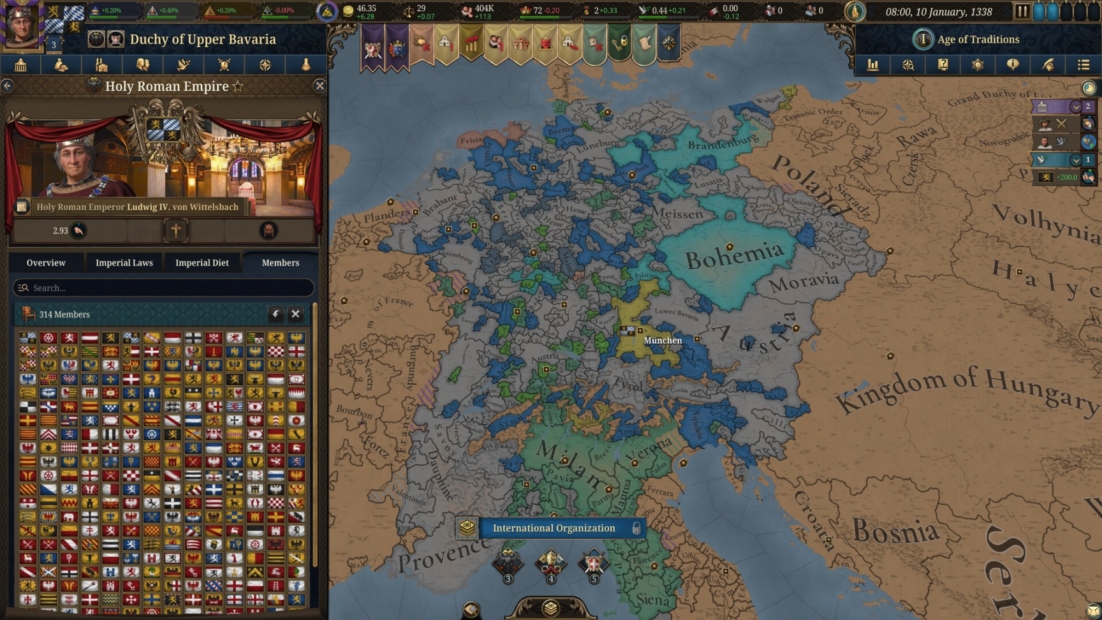
Each nation’s effort in battle is measured as War Participation. It influences how much they support the peace deal afterward. Ignoring your allies’ contributions could lead to angry partners once the war is over.
After peace is signed, a truce forms between war leaders. Breaking it early will damage your stability and reputation.
Master Diplomacy and Warfare with PLITCH!
If you want to conquer the world without endless grinding, PLITCH’s Europa Universalis 5 trainer has you covered. With Add Gold and Set Diplomats, you can boost your empire’s ambitions and keep numerous alliances intact. Use Easy Diplomacy to win over even the most stubborn nations, and maintain high stability with Set Stability.
When it’s time for war, activate Set Manpower, Set Army Tradition, and Fast Construction + Recruit to quickly prepare your armies. Reduce exhaustion with Set War Exhaustion and watch your campaigns run more smoothly than ever.
Head over to our Europa Universalis 5 Trainer Showcase on our YouTube channel to see our codes in action!
Happy Gaming!
Check out our other guides for the game:

